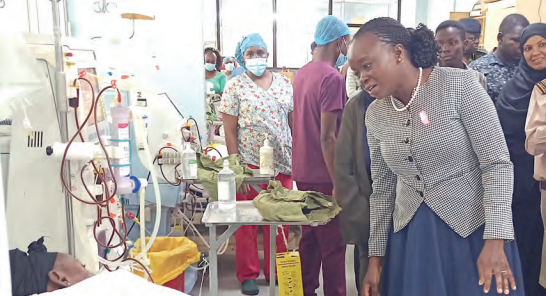
The Ministry of Health has released Sh9 billion to the Social Health Authority to reduce the debts owed to health facilities.
Health PS Harry Kimtai said the funds would be released to facilities by the end of this week.
It includes Sh1 billion allocated for Linda Mama programme to secure free maternal healthcare, he said.
The debts relate to services offered under the National Health Insurance Fund, before SHA was unveiled.
Private health facilities provide half of all health services in Kenya.
However, they are asking Kenyans to pay cash due to challenges with the IT system that runs SHA and unpaid debts by the government.
The government has also not clarified the packages offered under SHA chronic diseases such as cancer.
“We’re committed to addressing challenges to ensure no patient is turned away,” Kimtai said in Nakuru county on Tuesday.
He spoke during the inauguration of the Rift Region Multi-Sectoral Committee, which brings together CECs and county commissioners from Nandi, Kericho, Bomet, West Pokot, Uasin Gishu, Baringo, Turkana, Narok, Nyandarua, Laikipia, Samburu, Elgeyo and Nakuru.
The committee is tasked with steering registration efforts for SHA in the regions.
Two weeks ago faith-based health institutions, including the Christian Health Association of Kenya, the Kenya Conference of Catholic Bishops and the Supreme Council of Kenya Muslims had to scale down their health services due to the Sh7 billion debt owed to them by the NHIF.
The institutions said follow-ups over the debts accumulated through the EduAfya and Linda Mama programmes were yet to be resolved.
At that time, Kimtai said cumulatively, NHIF owed approximately Sh30 billion to all healthcare facilities, with counties collectively owed Sh12 billion.
At least Sh4 billion was released to all facilities last week.
Kimtai said in support of SHA’s rollout, the government has signed 26 agreements with the Council of Governors (CoG) to enhance medical equipment services in public facilities and has deployed 70 technical officers to assist county healthcare facilities.
Last week, cancer patients complained they were still paying cash for chemotherapy, radiotherapy and other related services in most private and mission hospitals.
At least 55 private and faithbased comprehensive cancer centres in Kenya have been empanelled by the Social Health Authority.
However, many of them say the new IT system is fraught with challenges and they are unable to log in many times or see the list of patients.
They therefore charge their clients rather than risk offering services on credit and later demand payment from SHA.
The Kenyan Network of Cancer Organisations and Cancer Survivors Association of Kenya said most cancer patients had fully paid their National Health Insurance Fund (NHIF) premiums for this year, but this is not reflected on the SHA portal.
“The current situation is untenable and jeopardises the health of cancer patients across the country. The government and SHA must act swiftly to protect the lives and well-being of these patients by addressing the outlined concerns,” said Phoebe Ongadi, the executive director of the Kenyan Network of Cancer Organisations.
Cancer is the third leading cause of death in Kenya, with 44,700 new cases and 29,300 deaths annually.
Prisca Githuka, the chairperson of the Cancer Survivors Association (CSA) of Kenya said many cancer patients, already facing late-stage diagnoses, rely on timely access to treatment for survival.
“The recent transition to SHA has, unfortunately, created barriers to accessing this life-saving care,” she said.
The two asked that the government reinstates full access to cancer services across all facilities and ensure no patient is asked to pay cash, turned away or denied care.
They also asked that the Social Health Insurance Fund resume coverage for overseas cancer treatment for patients who cannot access specialised care locally.
“We petition the government and SHA to provide transparent information on the oncology packages including premium amounts, payment options, and coverage details across the cancer continuum and engage civil society in public awareness efforts,” they said in a joint statement.
The cost of cancer treatment depends on the type of
cancer, the modality, cost of medicines and the type of inpatient admission.











